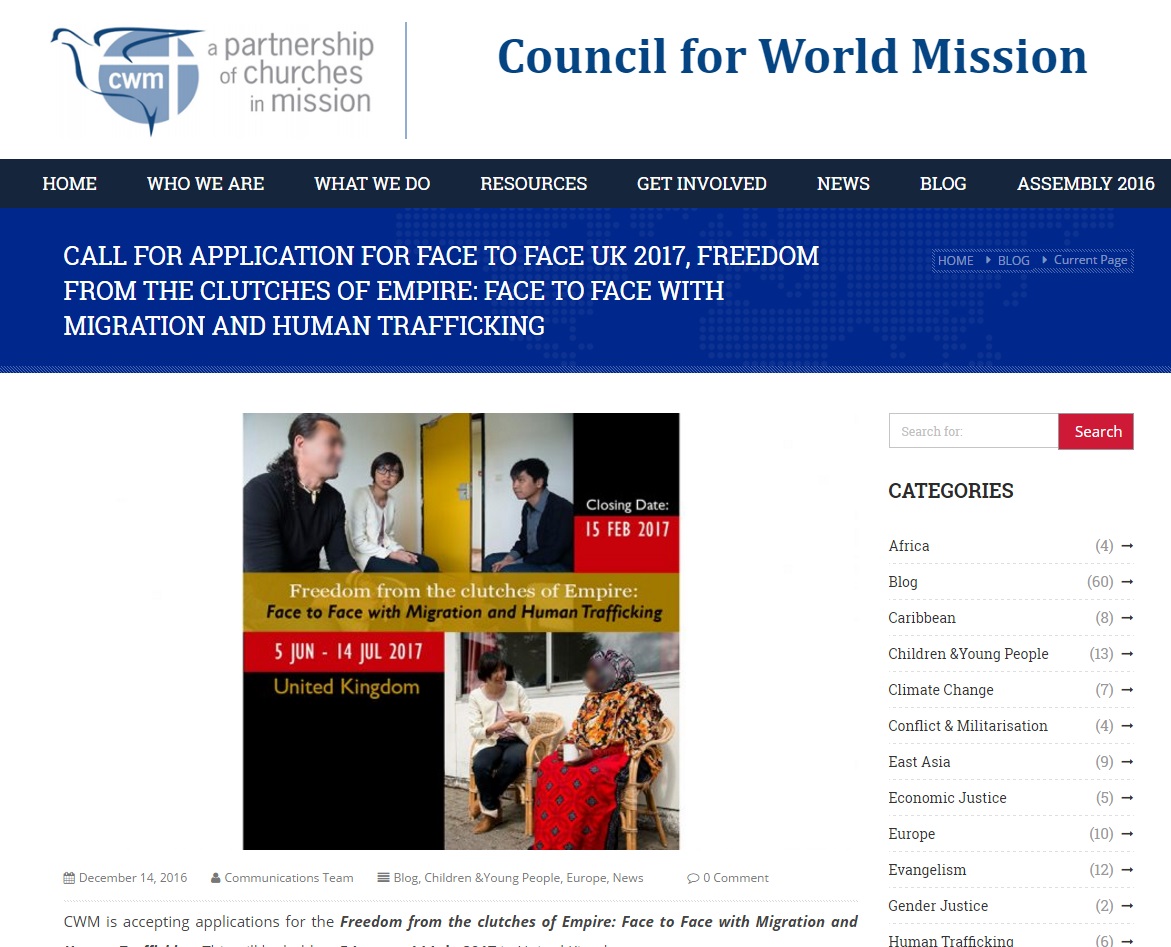
In 2015, there are as many as 21 million men, women, and children around the world are victims of “human trafficking”1 and as many as 244 million2 international migrants worldwide. “Trafficking in persons” and “human trafficking” have been used as umbrella terms for the act of recruiting, harbouring, transporting, providing, or obtaining a person for compelled labour or commercial sex acts through the use of force, fraud, or coercion. Migration, on the other hand is the movement of refugees, displaced persons, uprooted people as well as economic migrants, where migrants are people who make choices about when to leave and where to go, even though these choices are sometimes extremely constrained. Human trafficking and Migration are issues on freedom – or the lack of it. The face of modern day slavery persists around the globe in various forms such as: sex trafficking, child sex trafficking, forced bonded labour or debt bondage, involuntary domestic servitude, forced child labour, unlawful recruitment and use of child soldiers, etc. Whilst in spite of the many benefits of migration, migrants themselves remain among the most vulnerable members of society, they are often the first to lose their job in the event of an economic downturn, often working for less pay, for longer hours. Victims of both endure human rights violations, abuse and discrimination. At the centre of these is the empire’s goal of exploiting and enslaving the people and the myriad coercive and deceptive practices at the expense of income and profit. The Council for World Mission, inspired by its vision: “Fullness of Life though Christ for all creation” therefore recognizes that any form of human rights violations, abuse and discrimination is a denial of God of life. We believe in a God of freedom who abhors slavery in any form; and therefore the Church is called into the salvific work of Christ who sets the captive free. The Church is called to raise every valley and make low the mountains, to prepare the ground for the salvific work of a God of freedom. The Council for World Mission’s Freedom from the clutches of Empire: Face to Face with Migration and Human Trafficking exposes participants in social, cultural, theological and contextual realities so that they may grapple with and be motivated by the world around them. This will provide opportunities for the participants to learn and live, reflect and work together as they scrutinize the issues on migration and human trafficking in Europe, particularly in the United Kingdom. For seven weeks, they will engage in a learning community where through presentation, worship, bible study and reflection they consider issues of human trafficking and migration. Throughout the period participants engage in practical placements with different church communities and institutions which feed into and inform their reflections and thinking, leading to the presentation of a portfolio of material and written papers based on their experiences in the hopes to contribute to the combating these issues and to work towards the fulfilment of the promise of freedom. Some of the issues to be explored are:
‧A migrant theology, mission in the context of Empire, mission in a European post-Christian, secular context. ‧Issues of migration and human trafficking, homelessness and un-documented people and the role of the church. Objectives ‧To enable theological students to engage in a global dialogue on theology, spirituality and mission
‧To engage students with issues of human trafficking and migration in depth ‧To enable intercultural exchange and theological reflection contributing towards creating a global network of young theologians ‧To facilitate immersion programmes and Bible Studies which would enable students to reflect on doing mission in the context of Empire Who is this for This is open to students of Theology; either currently enrolled or has already graduated, but are not ordained ministers. Programme Dates The Programme will be held on 5 June to 14 July 2017. Where is it The Programme will be hosted by the United Reformed Church in the United Kingdom. The CWM Research and Capacity Development Unit, with the help of the CWM Europe Regional Office, administers the Face to Face Programme. However, the actual implementation is a shared responsibility among CWM, the sending church/college, the host church, and the participant. The Council for World Mission will arrange for and will cover the participant’s international travel, accommodation and meal expenses throughout the Programme, including stipend during the field placements. The Participants will need to arrange for their own passport and required visa, including transit visas if necessary. They may seek assistance from the Church/college. CWM will not cover cost of passport nor process the participant’s visa requirements. Participants will need to bring extra spending money for expenses outside those covered by CWM. They are expected to prepare an individual paper under the guidance of a college advisor, which critically reflects on their experience. This Programme is not designed to form part of any other degree or diploma course, however the paper may be included in the assessment process for the participant’s academic coursework, subject to prior agreement with the participant’s home college. CWM may also consider these papers for publication. How to Apply Interested applicants may contact the General Secretary of the Denomination Church or the Principal of the Theological College. Application forms may also be downloaded from the CWM website at: www.cwmission.org. You may also contact Sudipta Singh, Mission Secretary – Research and Capacity Development at (email): empowerment@cwmission.org. Duly completed application must be submitted via email at the above-mentioned email address or at hard copy to this address: Research and Capacity Development Unit, 60 Paya Lebar Road, #11-14 Paya Lebar Square, Singapore 409051 Deadline of application is on 15 February 2017. http://www.cwmission.org/call-application-face-face-uk-2017-freedom-clutches-empire-face-face-migration-human-trafficking/ |